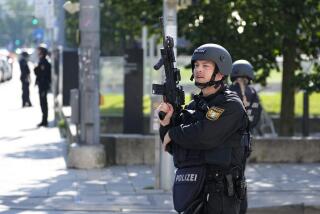Terrorism Rends a Time Meant for Peace
- Share via
In their ancient incarnation, Olympic games were supposed to be a time of peace on an otherwise battle-torn Grecian peninsula. Even Athens and Sparta would put down their weapons during the sacred Olympia and compete by running and wrestling, rather than by siege and slaughter.
The same was supposed to be true of the modern Summer Olympics, especially the 20th edition, held in 1972 in Munich. This was the Games’ first return to Germany since 1936, when Hitler had ruled the racist Reich and could not abide the gold medal victories of African American track star Jesse Owens. The 1972 Olympics were intended to showcase postwar West Germany’s civility, reform and reemergence from its painful past. Many Olympic tourists took respectful side tours to the nearby remnants of the Dachau death camp where Jews and dissidents were murdered in the Holocaust. And in a good-vibes coincidence, swimmer Mark Spitz, an American Jew, was becoming the hero of the Munich Games, with seven gold medals and seven world records.
Then, with four days remaining in the two-week event, eight Palestinian terrorists from the Black September group climbed over the Olympic Village fence, the same way that athletes returning from off-campus parties always had done. Automatic weapons, knives and grenades were hidden in gym bags. Their target was the dormitory for Israeli athletes.
They killed two Israelis, a wrestling coach and a weightlifter, in the opening assault. Nine more were held hostage, tied to furniture. The hooded terrorists announced their mission: to trade the Olympians for the release of 200 Palestinian prisoners from Israeli prisons. Israel’s Prime Minister Golda Meir, however, refused to negotiate. So the West Germans, torn from their celebration, suddenly were given the darkly ironic task of trying to save the young Jews. The world watched in horror. By the end of the debacle, all nine of the captive Israelis were dead, along with five terrorists and one West German policeman.
The illusion of Olympics peace was dead too. Never again would security be so lax; fear of terrorism during such a worldwide showcase would continue to haunt all future Games organizers. The unsolved pipe bomb explosion three years ago at the Atlanta Centennial Olympic Park, killing a bystander, showed the fear was merited.
*
The decision by Olympics in 1972 officials to allow the Munich Games to continue, after a one-day delay, is still debated. Would the entire Olympic movement have collapsed if those Games were canceled or delayed more after the hostage disaster? Would it have been a victory for terrorism if the Games were halted? Or was it the ultimate disrespect for the world to keep vaulting and cheering as caskets were headed to Israel and, for dual-citizen weightlifter David Berger, to Ohio?
Of broader importance, the role of terrorism and the methods to stop it were never to be so publicly debated and widely felt. Yes, the century is littered with the grief of bombs and massacres and kidnappings. But the Munich hostage-taking was the first covered live on prime-time television; images of hooded men on a dorm balcony circled the globe during a time of global celebration of the Games. This was before CNN’s instant coverage was able to regularly send us into overdrive over bombings at the World Trade Center, northern Ireland, Oklahoma City and Saudi Arabia. The Munich massacre may have provided the first hint that such a spotlight does not encourage good decision-making. After Munich, governments and police departments around the world trained special hostage teams and better investigated the psychology of such negotiations.
The hostage talks that September in Munich lasted nearly 20 hours, with German leaders offering to pay millions in ransom money and even to substitute German citizens for the Israelis. After the terrorists refused, helicopters were provided to take them and their prisoners to an airport 30 miles away. A Boeing 727 was at hand for escape, but the Germans never intended to let it take off. Surrounding police sharpshooters planned to pick off the Palestinians and rescue the Israelis.
Tragically, the plan was bungled. A policeman fired too soon. In the awful cross-fire, one terrorist tossed a grenade into a helicopter, killing hostages, while another kidnapper executed the other athletes. (The three surviving terrorists were released a few months later in a deal over a hijacked Lufthansa plane.) Israel then went vigilante, its secret agents reportedly assassinating nine to 12 ringleaders of the Olympic attack; one hit was an admitted mistake, on an innocent Moroccan waiter in Norway.
Today, Palestinians and Israelis are fitfully taking steps toward Middle East peace. And domestic terrorism, political or not, now is striking at Middle American schools, churches, offices and child-care centers.
More to Read
Go beyond the scoreboard
Get the latest on L.A.'s teams in the daily Sports Report newsletter.
You may occasionally receive promotional content from the Los Angeles Times.







